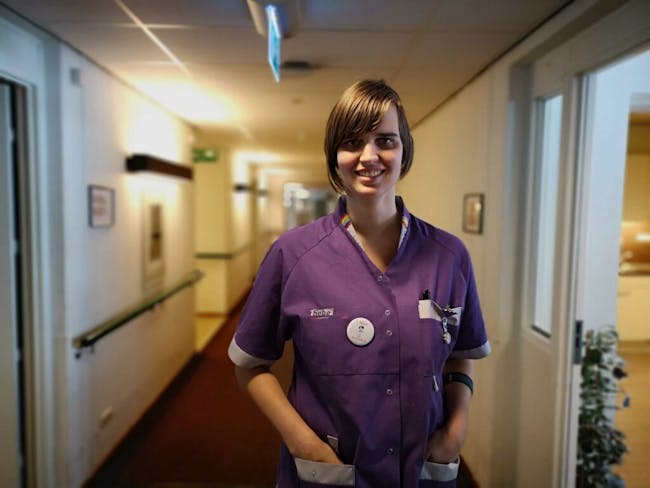“When you can get through to someone in an advanced stage of dementia, it’s just wonderful”
Joyce Foesenek is a personal care assistant at Thebe Lucia residential care center where she cares for people living with dementia. Tover works closely with Thebe Lucia as a co-design location, which means we work with them and their residents to develop our games for the Tovertafel. But what is a day in the life of a care worker really like? We followed Joyce to learn more about the ins and outs of her role.
“Thank you so much for the good care,” says a woman who is helping her husband move to another nursing home today. “I hope they have good nurses there, too.” Joyce Foesenek, personal care assistant, smiles kindly at the couple and waves them goodbye. Today we’re following her during a typical day on the workfloor.
“It’s not always easy when someone moves or passes away,” says Joyce after the woman and her husband leave. “You build trust in your relationships with the residents. Even with the people who have dementia.” When asked if we could follow Joyce for an afternoon, her response was, “But I don’t do it alone, you know! I do it with the whole team.”
“Care is one of the most underpaid jobs,” she says. “It’s no wonder that there are less and less people applying. Yet, we desperately need permanent colleagues to be able to continue providing great care. That would give both employees and residents peace of mind.”
Meanwhile, a resident comes running up to Joyce with a complaint: “I’m sitting here against my will. When can I go home?” There are tears in her eyes. It’s a heartbreaking moment but Joyce remains calm, friendly, and firm. She patiently explains to the woman that unfortunately there is nothing she can do about it. “I understand her very well,” Joyce later explains. “I still try to make someone’s stay here as pleasant as possible. That’s all we can do.”
Care technology to get to know residents better
The sun is shining and Joyce explains how, on quiet days, she occasionally takes a resident outside: “This is what you do it for: basking in the sun, enjoying a bit of small talk. Even though many residents have advanced dementia, you get to know the real them during moments like this.”
Care technologies can also help. At Thebe Lucia residential care center, various technologies are used to make it easier for caregivers to get to know their residents better. Technology can provide space for residents’ emotional expression. Joyce proudly shows us two multi-sensory rooms that are filled to the brim with ‘warm technology’: a water bed, a bathtub with a lift to help residents with mobility problems get in and out of it, bubble tubes, and a music system. Which are all intended to give the residents a warm, enjoyable environment.

"You can use it to activate residents, but also to bring calm when things get out of hand."
Back at the psychogeriatrics department, a number of staff members are busy gathered around the Tovertafel that is hanging in one of the living rooms. “You can use it to activate residents,” one staff member explains to another, “but also to bring calm when things get out of hand.” An intern is frantically taking notes while an elderly man with dementia reaches in surprise for a water lily moving across the table while playing the game “Fish” on the Tovertafel. “That’s something, alright,” he says, as he winks at one of the caregivers.
Caring: it’s in the DNA
Meanwhile, Joyce asks a colleague how her husband is doing. “Yes, we are very involved with each other as colleagues,” she agrees. “We work so closely together. We talk to each other a lot, even when we’ve had a difficult day at work. But fortunately, most days are very nice.”
Joyce and her colleagues radiate the fact that caring is part of their DNA. The natural way they take a moment to put an affectionate hand on one resident’s shoulder, or joke with another. It’s as though they’re always looking to establish genuine connections, and take their residents seriously, without losing sight of their responsibilities as caregivers.
“Sometimes you have to be clear,” says Joyce. “Clear, yet nice.” Appearing to do so effortlessly, Joyce divides her attention between the various residents, colleagues, visitors, and the admin tasks that await her.
Why Joyce started working in healthcare is as clear as day to her. “I gained a lot of respect for the elderly from my upbringing. That’s why I enjoy making their day a little brighter. The contact with residents is so special. When you can get through to someone in an advanced stage of dementia, it’s just wonderful. Or when you get a wink from someone, like just now while playing with the Tovertafel. That’s great, right?”




